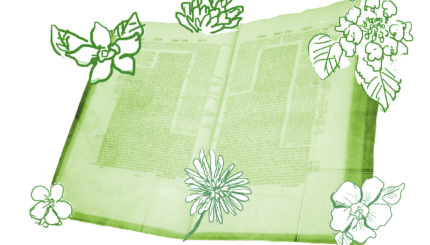For some time, the Gemara has been thinking through indirect speech as part of a larger discussion about the obligation to remove leaven from one’s house for the holiday of Passover. As page 4 came to a close, we returned more squarely to the subject at hand. The mishnah taught us that we must search for leaven at night on the 14th of Nisan, but when do we actually remove it? Two seemingly contradictory verses are brought to our attention:
It is written, “Seven days leaven shall not be found in your houses” (Exodus 12:19) and it is written, “Yet, on the first day, you shall remove leaven from your houses.” (Exodus 12:15)
So which is it? Are we supposed to, per Exodus 12:19, remove the leaven before the holiday begins so that our homes are leaven-free for all of Passover; or, does the removal occur on the first day of the holiday?
One way to solve such a contradiction is through reinterpretation. Abaye takes this approach, suggesting that 12:19 requires us to have leaven-free houses during Passover and 12:15 instructs us to eliminate leaven on the fourteenth of Nisan, the day before Passover. Rav Nachman bar Yitzchak notes that the word for “first,” rishon, can also be understood to mean “previous” (see Job 15:7); so, the verse might be referring to the day before the first day, i.e., the fourteenth. Ultimately, the Gemara rejects this reading, citing verses about Sukkot that suggest that when the Torah says “rishon,” it really does mean the first day of the holiday, and not the day before.
Since this reinterpretation of Exodus 12:15 failed, the Gemara pauses to consider whether the 14th is in fact the day of removal and quickly determines, in a flurry of arguments, that it is. For instance, Rabbi Yishmael teaches:
Exodus 34:25 states, “You shall not slaughter the blood of my offering over leavened bread,” meaning that you shall not slaughter the Paschal lamb while your leavened bread is still intact.
The Paschal lamb is slaughtered on the 14th of Nisan, before the holiday begins. In order to be rid of your leaven in time to slaughter the lamb, it too must be gone by the 14th.
Similarly, Rabbi Akiva points to Exodus 12:17 which proscribes work, including kindling fire, on the first day of the holiday. Since leaven is traditionally burned, it must be removed before the holiday begins, when it is still permissible to start a fire.
But even with these proofs that leaven is definitely removed on the 14th of Nisan, it is still necessary to make sense of Exodus 12:15, which seems to call for its removal on the 15th. Rabbi Yosei tries another reinterpretation, focusing on the word “yet” at the start of the verse and suggesting that it teaches that we divide the day into two parts, one in which leaven is permitted and one in which it is forbidden. And, says the finally triumphant Gemara, if the verse permits the eating of leaven on part of a day, it must be talking about the day before Passover, because eating leaven is clearly forbidden on Passover itself.
In summary, it’s clear that the rabbis of the Gemara are troubled by the fact that Exodus 12:15 seems to call for the removal of leaven on the 15th, the first day of Passover, and thereby challenges established tradition. It solves the dilemma with a two-pronged approach: proving the 14th is the correct removal date, and reinterpreting the problematic verse so that it is consistent with established tradition.
Read all of Pesachim 5 on Sefaria.
This piece originally appeared in a My Jewish Learning Daf Yomi email newsletter sent on November 26, 2020. If you are interested in receiving the newsletter, sign up here.



